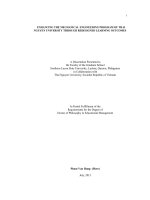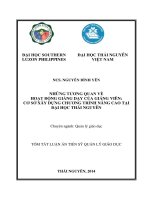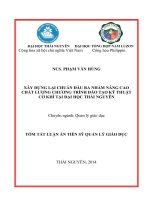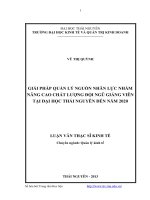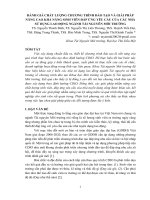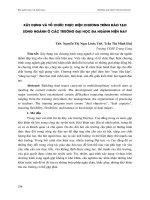Xây dựng chuẩn đầu ra nhằm nâng cao chất lượng chương trình đào tạo Kỹ thuật Cơ khí tại Đại học Thái Nguyên
Bạn đang xem bản rút gọn của tài liệu. Xem và tải ngay bản đầy đủ của tài liệu tại đây (2.65 MB, 148 trang )
i
ENHANCING THE MECHANICAL ENGINEERING PROGRAM OF THAI
NGUYEN UNIVERSITY THROUGH REDESIGNED LEARNING OUTCOMES
A Dissertation Presented to
the Faculty of the Graduate School
Southern Luzon State University, Lucban, Quezon, Philippines
in Collaboration with
Thai Nguyen University, Socialist Republic of Vietnam
In Partial Fulfillment of the
Requirements for the Degree of
Doctor of Philosophy in Educational Management
Pham Van Hung- (Hero)
July, 2013
ii
APPROVAL SHEET
This dissertation entitled “Enhancing the Mechanical Engineering program
of Thai Nguyen University through redesigned learning outcomes” submitted by
PHAM VAN HUNG, in partial fulfillment of the requirements for the Degree of
Doctor of Education Management been examined and is recommended for
acceptance and approval.
MELCHOR MELO O.PLACINO, Ph.D Adviser
Approved by the Oral Examination Committee, in partial fulfillment of
the requirements for the degree of Doctor of Education Management by Southern
Luzon State University, Republic of the Philippines in collaboration with Thai
Nguyen University, Socialist Republic of Vietnam
DR. TERESITA V. DE LA
CRUZ
member
DR. APOLONIA ESPINOSA
member
DR. WALBERTO A.
MACARAAN
member
PROF. NODERINA B.
ILANO
member
Critic Reader
Chairman: CECILIA N. GASCON, Ed.D
Accepted in partial fulfillment of the requirements for the degree of
Doctor of Education Management by Southern Luzon State University, Republic
of the Philippines in collaboration with Thai Nguyen University, Socialist
Republic of Vietnam
APOLONIA ESPINOSA, Ed. D
Dean, Graduate School
Date _________________
iii
ACKNOWLEDGEMENT
The author would like to express her gratitude to the following persons
who had great contribution to the preparation and accomplishment of this
research.
Sincerest and profound gratitude and appreciation are extended to all the
persons who in their own special ways have made this thesis a reality. The author
is most grateful to:
Hon. Dr. Cecilia N. Gascon, President of Southern Luzon State
University, Republic of the Philippines, for her invaluable contribution in
establishment of the Master of Arts in Educational Management program in Thai
Nguyen University;
Prof. Dr. Dang Kim Vui, President of Thai Nguyen University, the
Socialist Republic of Vietnam for his incomparable contribution and support to
the Doctor of philosophy in Educational Management program under the auspices
of the Southern Luzon State University, Republic of the Philippines;
Dr. Walberto A.Macaraan, Vice-President for Extension and Research,
for his support to the tie-up program between SLSU and TNU;
The Panel of Examiners, for their invaluable comments, suggestions and
recommendations to enhance the thesis manuscript of the author of this study;
Prof. Dr. Melchor Melo O.Placino, his adviser, for his dedication,
enduring patience and concern, guidance, sincere hopes and encouragement for
the researcher to finish the manuscript;
Prof. Dr. Apolonia Espinosia, professor of advanced statistics for her
patience and support;
To the Learning Resource Center of Thai Nguyen University, for the
valuable sources of books and references;
To the authors and researchers of books and unpublished graduate theses
that served as reliable source of data and information presented in the study;
iv
Special thanks to:
Prof. Phan Quang The, Rector of Thai Nguyen University of
Technology for the approval of the researcher’s request to conduct the study;
The respondents of the study, for their active involvement, without their
cooperation the result of this dissertation may not be possible;
His loving classmates and colleagues, for endless support and friendship
which inspires the researcher to put in her best in finishing the study;
His wife – Dinh Thi Kim Phuong, the only person with a special space in
his heart for being his inspiration;
His parents and siblings, for their encouragement, financial, moral and
spiritual supports and for continuously believing that he can finish the task to the
best of his abilities
PVH
v
DEDICATION
With pride and honor,
This piece of work is lovingly dedicated
to his beloved parents, wife and children
for their endless support
And for being his constant source of inspiration
Pham Van Hung (Hero)
vi
TABLE OF CONTENT
Title page …………………………………………………………………… i
Approval sheet …………………………………………………………… ii
Acknowledgement ………………………………………………… iii
Dedication ………………………………………………………………… v
Table of content …………………………………………………………… vi
List of table …………………………………………………………………
List of figure………………………………………………………………
List of appendices ………………………………………………………….
ix
xi
xii
Abstract ……………………………………………………………………. xiii
CHAPTER
I. INTRODUCTION
Background of the Study …………………………………………… 2
Objective of the study …………………………………… 6
Significance of the Study ……………………………………………. 6
Scope and Limitation ………………………………………………… 7
Definition of Terms ………………………………………………… 7
II. REVIEW OF LITERATURE AND STUDIES
Learning outcomes …………………………………………………… 10
Type of learning outcomes ……………………………………………. 12
Learning outcomes and outcomes-based approaches ………………… 18
The role of learning outcomes in program design and improvement …. 19
Learning outcomes and learning objectives …………………………… 22
How to write Learning outcomes ……………………………………… 22
Quality and Quality in Education ……………………………………… 23
Engineer standards and criteria ……………………………………… 24
CDIO initiative ……………………………………………………… 27
The formulation of learning outcomes ………………………………… 29
Research Diagram …………………………………………………… 31
vii
III. METHODOLOGY
Locale of the Study …………………………………………………… 33
Research Design ……………………………………………………… 33
Population and Sampling …………………………………………… 33
Research Instrumentation …………………………………… 34
Data Gathering Procedure ……………………………………………. 36
Statistical Treatment of Data ………………………………………… 36
IV. RESULTS AND DISCUSSION
4.1. The importance of each learning outcome topic under the view of the
four main stakeholders of the MEP
40
4.1.1. The importance of each learning outcome topic under the view of the
students.
40
4.1.2. The importance of each learning outcome topic under the view of the
alumni.
45
4.1.3. The importance of each learning outcome topic under the view of the
teachers.
47
4.1.4. The importance of each learning outcome topic under the view of the
employers
50
4.2. Evaluate the current status of learning outcomes and the expected LOs
of MEP
55
4.2.1. Graduating students 55
4.2.2. Faculty 58
4.2.3. Alumni 66
4.2.4. Employers 74
4.3. The correlation among the important level of learning outcomes,
current proficient level of the students, the expected proficient level
that the students should achieve.
80
4.4 The Process for formulating the redesigned learning outcomes for the
MEP.
81
V. SUMMARY OF FINDINGS, CONCLUSION AND RECOMMENDATIONS
Summary and findings ……………………………………………… 84
Conclusion ……………………………………………………………. 87
Recommendations ……………………………………………………. 88
REFERENCE
A. Books ……………………………………………………………… 90
B. Internet sources ……………………………………………………… 90
viii
APPENDICES
A. Questionnaires ……………………… ……………… 92
B. Statistical Computations ………………….……………… 100
CURRICULUM VITAE …………………………………………………… 135
ix
LIST OF TABLES
TABLE
1 Number of respondents of the pilot survey… ………………………
2 Number of qualified questionnaires ……………………………………
3 The importance of the Disciplinary knowledge and reasoning topics under
the view of the students………… ……………………………
4 The importance of the Personal and Professional Skills and Attributes
topics under the view of the students…………………………………
5 The importance of the interpersonal skills: Teamwork and communication
topics under the view of the students………………
6 The importance of conceiving context topics under the view of the
students……………………………………………………………
7 The importance of conceiving enterprise context and designing topics
under the view of the students…………………………………
8 The importance of implementing and operating the system topics under the
view of the students…………………………………………….
9 The importance of the Disciplinary knowledge and reasoning topics under
the view of the alumni………………………………………
10 The importance of the Personal and Professional Skills and Attributes
topics under the view of the alumni…………………………………
11 The importance of the interpersonal skills: Teamwork and communication
topics under the view of the alumni…………………
12 The importance of the Disciplinary knowledge and reasoning topics under
the view of the teachers………………………………………
13 The importance of the interpersonal skills: Teamwork and communication
topics under the view of the teachers………………
14 The importance of implementing and operating the system topics under the
view of the teachers……………………………………………
15 The importance of the Disciplinary knowledge and reasoning topics under
36
38
41
42
42
43
44
44
45
46
47
48
49
50
x
the view of the employers………………………………………
16 The importance of the Personal and Professional Skills and Attributes
topics under the view of the employers………………………………
17 The importance of the interpersonal skills: Teamwork and communication
topics under the view of the employers……………
18 The importance of the Applying skills under the view of the employers.
19 The Current and Expected proficient level of Designing under view of
students…………………………………………………………
20 The Current and Expected proficient level of Operating under view of
students………………………………………………………….
21 Results of survey on Knowledge of underlying mathematics and sciences
…………………………………………………………
22 Results on analytical reasoning and problem solving……………
23 Results on experimentation, investigation and knowledge discovery…
24 Results on system thinking……………………………………….…
25 Results on attitudes, thoughts and learning…………………………
26 Results on ethics, equity and other responsibilities…………………
27 Results on external, societal and environmental context……………
28 Results on conceiving, systems engineering and management ……….
29 Results on operating……………………………………………….
30 Results of survey on Knowledge of underlying mathematics and sciences
31 Results on analytical reasoning and problem solving…………………
32 Results on attitudes, thoughts and learning…………………………….
33 Results on interpersonal skills: teamwork and communication………
34 Results on external, societal and environmental context……………
35 Results on enterprise and business context………………………
36 Results on conceiving, systems engineering and management…………
37 Results on implementing…………………………………………
38 Correspondence between the Bloom’s taxonomy and proficiency scale …
51
52
52
53
56
56
58
60
61
61
61
62
63
64
65
66
68
69
70
71
71
72
73
81
xi
LIST OF FIGURES
FIGURE
1 The relationship between occupational standards and training
standards …………… …………………………………
2 Learning outcomes in the development of program………….
3 Framework for understanding educational quality ………….
4 Building blocks of knowledge, skills, and attitudes necessary
to Conceive, Design, Implement, and Operate Systems in
the Enterprise and Societal Context (CDIO). ….… ………
5 The schematic presentation of the study to develop the
learning outcomes which meet the requirements of the
society and international integration………………………
19
20
24
28
31
xii
LIST OF APPENDICES
Appendix
A Questionnaires …………………………………… ………
92
B Statistical Computations ……………………………… … 100
xiii
ABSTRACT
TITLE OF RESEARCH:
Enhancing the Mechanical Engineering program of Thai
Nguyen University through redesigned learning
outcomes
RESEARCHER:
Pham Van Hung
DEGREE CONFERRED: Doctor of philosophy in Educational Management
INSTITUTION: Southern Luzon State University – TNU
ADVISER:
MELCHOR MELO O.PLACINO, Ph.D
YEAR WRITTEN: 2013
_________________________________________________________________
Formulation of the learning outcomes which meet the requirements of the society
plays an important role in order to improve the quality of the program. This study aims at
redesigning the learning outcomes of the Mechanical Engineering Program at Thai Nguyen
University of Engineering using the survey results from the main stakeholders (employer,
alumni, teacher and student) of the program. Questionnaires were distributed to target
respondents. The data was processed using SPSS. Results were subjected to t-test. The
results were discussed by educational experts, institutional managers and teaching staff.
The results of the study showed that all the draft learning outcome topics were important
for the engineer, however, the current learning outcomes and competences of the students
did not meet the requirements of the employers, alumni, teaching staff and students with
regard to the knowledge and skills the graduate and student of the program possess. The
learning outcomes of the Mechanical Engineering Program were rewritten with reference
to the comments and contribution of its main stakeholders. On the basis of the new
learning outcomes, the program should be adjusted to provide its students with proper
knowledge and skills based on the redesigned learning outcomes.
1
Chapter I
INTRODUCTION
In recent years, the scale of development of training has increased significantly in
Vietnam. By the end of the first semester of school year (2010-2011), there were 149
higher education institutions (HEIs) with 1,358,861 college students and 45,961 teachers.
Providing accountability data and consumer information on the quality of teaching and
learning has been increasing pressures on the HEIs.
The Vietnamese Government and the Ministry of Education and Training have
stated the concern about the learning outcomes of HEIs to ensure the quality of training
and accountability towards the Government and the society. In 2008, at a national
conference on the quality of higher education which was held in Ho Chi Minh City on
January, 8
th
2008, the Deputy Prime Minister, Minister of Education and Training Nguyen
Thien Nhan appealed to the universities & colleges to improve the quality of instruction:
that by December, 2008 all universities, colleges must develop their training standards,
conduct training to achieve the learning outcomes (LOs) set, students should be properly
informed about their level of competence, how to achieve the learning outcomes, and what
skills they will have after completing the courses, etc.”
Minister Nguyen Thien Nhan confirmed that the transition from training based on
HEIs’ availability to training which met the requirements of the society was the most
important, fundamental and urgent change in current period. The Minister gave 09 criteria
to ensure quality standards in training to meet social needs, including: (1) Skills,
competences of graduates; (2) The input; (3) Training programs (4) Faculty, staff
management; (5) Teaching and assessing learning outcomes of students; (6) Condition of
facilities, technique (7) Finance; (8) Decentralized management mechanism; and (9)
Accreditation, training quality evaluation.
Article 9, Vietnamese Education Law, 2005 on Education development states that
“Education development is a first national priority with a view to improving people’s
knowledge, training manpower, and fostering talents. Education development must be
linked to the requirements of socio-economic development, to the scientific-technological
advances, and to the consolidation of national defense and security; must implement
standardization, modernization, and socialization; must ensure the balance in terms of
2
qualifications, professional and regional structure; must expand scale on the basis of
quality and efficiency assurance; and must link education with employment…”
Criteria 3.1, 3.2, 3.3, 4.7 of the Vietnamese set of accreditation standards for higher
education institutions (issued together with Decision No. 65/2007/QD-BGDDT November
1, 2007) also explicitly highlight the educational program must be developed and adjusted
based on the consultancy of the employers , alumni and other stakeholders of the program
and "the universities are to have plans to evaluate the quality of training after graduation
and plans to adjust training to meet the requirements of society".
The Vietnam Government also issued official document on the “Reform of
education management period 2010 – 2012” which highlighted that training to meet social
needs is an important task and we must foster training quality to meet the requirements of
the society at national level as well as at local level and at each training institution.
Thai Nguyen University has been full of awareness of the importance of training to
meet social needs and international integration. Since 2008, the University has directed its
members in making plans to provide quality training. The University has organized 02
training courses on formulating learning outcomes for more than 200 leaders of its member
colleges and units. However, in the implementation process, the consultation of the
employers and alumni as well as other stakeholders has not been focused and the learning
outcomes of some programs were at the following two types (1) too high to achieve and (2)
too low that does not meet with the requirements of the present socio-economic
development and some are too general which do not provide basis for the development of
the program. It is the reason why this study is very imperative in Thai Nguyen University.
BACKGROUND OF THE STUDY
Faculty of Mechanical Engineering
The Faculty of Mechanical Engineering (TFME) is one of the largest and oldest
departments of the Thai Nguyen University of Technology. It is responsible for the training
of highly qualified technicians to meet the needs of industrialization and modernization of
the country and the need to integrate with the world. In addition, the faculty organizes and
implements scientific research, applying the results in production for engineering as well
as other fields.
3
The faculty is divided into five departments, including Departments of
Manufacturing Plant, the Department of Mechanical Engineering, Materials Technology
department, the departments of Mechatronics and Automotive Technology. Each
department of the Faculty is responsible for a specialized field of training.
TFME has an enthusiastic teaching team. Currently, the department has nearly 100
staff and teachers involved in teaching and working. Over 60% members of the faculty
have Masters and Doctorate degree, in which 30% are core teachers and 40% are Associate
Professor and Ph.D. holders.
TMFE is currently teaching 86 classes with over 5700 full-time and part-time
students. Among these, there are more than 4400 full-time students with 54 classes.
Over 38 years of construction and development, the Faculty has trained more than
15,000 masters, engineers, college degree, and hundreds of technicians. In terms of jobs
and work places, from North to South, from the main cities to the mountainous areas,
remote islands, from lecture halls of universities to companies, state enterprises or private,
TMFE former students can be found.
Not only the quantity but the quality of the Faculty’s training was approved and
highly appreciated. Moreover, these technical staffs are trained to maximize the knowledge
learned in order to contribute effectively to national construction and defense. Many
alumni of the faculty have now become the leaders and held important positions in society.
Mechanical Engineering Program (MEP)
The MEP was designed and formulated based on regulation of the Vietnamese
Ministry of Education and Training. The contents of the program were originally designed
by the experienced senior lecturers of the University. The contents of the program have
been adjusted recently due to the Vietnamese policy to import the programs of developed
countries and the MEP has imported some of the content of the Mechanical engineering
program of University of Buffalo, USA. It is the reason why the program has many
updated knowledge of engineering with a view to provide the students with the wide and
fundamental engineering knowledge, the updated knowledge of design including methods,
design procedure and design tools.
4
However, after 2 completed 5-year-course training, the program has shown some
problems that need fixing.
First, many graduates have to attend further training of 4-6 months before finding a
job according to the results of the survey by the university. The graduates are said to lack
the necessary skills such as team work and communication, besides they lack the proper
practices in order to work in a new environment, it takes a lot of time for them to be
familiar with the new conditions.
Second, with regard to the content of the program, the logistic among subjects is
not proper, some can be cut down or cut off without affecting other subjects while these
subjects do not directly provide expected outcomes knowledge and skills.
Third, timing and program specifications of some modules are not suitable;
especially those require the students’ skills.
These problems could be defined as the wrong way of forming a program for the
MEP, that they based on the experience of a group of people and they chose what to teach
based on their emotions. The learning outcomes of the MEP were the same as that of the
Mechanical Material and other program which stated as follows:
The MEP would provide the students with:
1. Qualities
a. Political qualities: Understanding and responsibilities: observance of policy
guidelines, policies and laws of the Party, State and in implementing rights and obligations
of citizens and workers.
b. Humanistic qualities: Honest, energetic, confident, responsible and conscious
community service, harmony and market demand; Dare to think, dare to confront new and
known risks.
2. Knowledge
- Provide with strong suitable foundation of basic sciences like mathematics,
chemistry, physics, philosophy, etc.; core knowledge base of mechanical engineering and
other related fields.
5
- Provide students with specialized knowledge in the design, fabrication machine;
presented and applied to solve engineering problems creatively through the use of methods
and techniques: synthesis, distribution analysis, calculation, design and manufacture.
- Provide students with knowledge and understanding of contemporary issues.
3. Skills
a. Study skills, self-study.
b. Skills to use information technology: Proficient in using computational software,
design, simulation and programming capabilities production control system; Good
command of office software applications, internet and email.
c. Communication skills: Have the ability to form logical arguments and
persuasive; shown capable technical solutions or presentations with graphics, models and
multimedia materials; communication skills in writing, email; Skills to present problem
logically, briefly and easy to understand.
d. Teamwork: Ability to organize work groups effectively can play a role as leader
or member participates in the same group or multi-disciplinary field of international
working environment.
e. Foreign Languages: Ability to read, translate technical documents in English,
have basic communication skills in English in social and professional.
It can be seen from the current learning outcomes that most of the professional
outcomes related to knowledge, however, what the society needs from an engineer is not
their knowledge but also their competency and practicing skills.
Using the modern theory in developing a program, the Faculty should start from the
learning outcomes that are designed based on the demand of the society, employers,
alumni and other stakeholders of the program. It’s the reason why the learning outcomes of
the MEP should be redesigned to prepare for the whole improvement of the MEP.
6
OBJECTIVES OF THE STUDY
1. Determine the importance of draft learning outcomes items of the Mechanical
Engineering Program in terms of:
1.1. Disciplinary Knowledge and Reasoning
1.2. Personal and Professional Skills and Attributes
1.3. Interpersonal Skills: Teamwork and Communication
1.4. Applying Knowledge to Benefit Society.
2. Evaluate the current status of learning outcome topics and the expected LO
topics of MEP by:
2.1. Alumni
2.2. Faculty
2.3. Graduating students
2.4. Employers.
3. Redesign the learning outcomes for the MEP.
SIGNIFICANCE OF THE STUDY
This study attempts to develop the learning outcomes for Mechanical and
Engineering Program which meet the requirements of the society and the international
integration. The study would be beneficial to the followings:
Administrators: It is hoped that the study will make clear about the state of the
arts of learning outcomes and what the stakeholders of the program are expected from the
graduate of the program. The finding of the research will help to reform the training
program towards the outcome-based education in regional higher education institutions.
Teachers/ Professors: The outcome of this study will be very beneficial to teachers
and professors since they provide them with a clearer picture of what others stakeholders
are expected them to provide, and also give them guidelines to organize their teaching to
meet with the demands of the society and the current trend of international integration.
Students: The students are the main stakeholder of the training process, so with the
results of this study, students will have a better choice on the learning strategy to get the
7
best outcomes of knowledge, skills and attitude. They will benefit the changes in the
program for the better achievement of the learning outcomes set.
Future researchers: This study could provide references for future proponents
who wish to venture a study similar to the nature of this ongoing research.
SCOPE AND LIMITATION OF THE STUDY
The study was implemented in the Faculty of Mechanical Engineering - College of
Engineering - Thai Nguyen University with the involvement of 250 students who are in the
senior year and graduating in June, 2013; 50 faculty who are teaching in the program; 100
enterprises representatives; 100 alumni of the MEP.
Learning outcomes are classified into knowledge outcomes, skills outcomes and
attitude outcomes and divided into four groups: (1) Disciplinary Knowledge and
Reasoning (2) Personal and Professional Skills and Attributes (3) Interpersonal Skills:
Teamwork and Communication (4) Applying Knowledge to Benefit Society.
To define the outcomes for the program, survey on the different stakeholders of the
MEP will be carried out. Representatives of the enterprises where alumni of the MEP
work, alumni, faculty and students/ graduate will be the participants of the survey.
Development of the learning outcomes was limited to the use of questionnaires,
expert discussion and consultancy. Checklists were developed for the purpose of the study.
The timeframe for the study is from February 2013 to July 2013.
DEFINITION OF TERMS
For clarity and better understanding of the study, the following terminologies are
defined both conceptually and operationally.
Cognitive outcomes include domain-specific knowledge, reasoning and problem-
solving skills.
Communications is composed of the skills necessary to devise a communications strategy
and structure, and those necessary to use the four common media: written, oral,
graphical, and electronic. ( />modules/interpersonal-skills-teamwork-communication)
Disciplinary knowledge and reasoning includes knowledge of basic sciences and core
engineering fundamental knowledge and professional engineering knowledge.
8
Experimental Inquiry is a special kind of problem solving that is governed by rules of
process and evidence, a process of generating and testing hypotheses for the
purpose of understanding some physical or psychological phenomenon.
( />xperimental_inquiry.htm)
Interpersonal skills are skills used by a person to properly interact with others. In the
business domain, the term generally refers to an employee's ability to get along
with others while getting the job done. Interpersonal skills include everything from
communication and listening skills to attitude and deportment.
(
Learning outcomes describe what a learner is expected to know, to understand and be
able to demonstrate after successful completion of a process of learning. They are
statements of concrete and verifiable signs that witness/ certify how the planned
competences, including the required levels of knowledge are being developed or
acquired. (
Degree_PR4.pdf)
Non-cognitive outcomes consist of suggestions and supports for the completion of study
beliefs, values and attitude.
Personal Skills and Attitudes include the general character traits of initiative and
perseverance, the more generic modes of thought of creative and critical thinking,
and the skills of personal inventory (knowing one’s strengths and weaknesses),
curiosity and lifelong learning, and time management. (EF Crawley - 2001, The
CDIO Syllabus)
Professional Attributes are characteristics of an engineer including professional integrity
and professional behavior to plan for one’s career and to stay current in our
dynamic world of engineering. />materials/personal-and-professional-skills-attributes
Redesigned learning outcomes are learning outcomes that are designed based on the
previous one with the consultancy of ideas from employers, alumni, teachers and
students and administrators.
Requirements of the society include the requirement of people (faculty, students),
employers, alumni and government.
9
Teamwork is comprised of forming, operating, growing, and leading a team, along with
some skills specific to technical teamwork.
Thinking holistically involves perceiving a system through sensing its large-scale patterns
and reacting to them. Holistic thinking is mostly applied in social situations which
need sensitivity, intuition and tact.
10
Chapter II
REVIEW OF LITERATURE AND STUDIES
This chapter presents the literature and studies of the learning outcomes, the roles
of the learning outcomes in developing the curriculum and the program, the quality in
education, the engineer criteria of some organizations and how to formulate the learning
outcomes of a program.
The first part presents the educational program and some definitions of learning
outcomes.
According to “An educational
program is a program written by the institution or ministry of education which determines
the learning progress of each subject in all the stages of formal education”.
Learning outcomes
Learning (whether in cognitive, affective, interpersonal or psychomotor domains) is
said to involve a process of individual transformation. Thus people actively construct their
knowledge (Biggs and Moore, 1993).
Learning outcomes refer to the personal changes or benefits that follow as a result
of learning. Such changes or benefits can be measured in terms of abilities or
achievements. There have been a lot of definitions of learning outcomes. “Learning
outcomes are statements of what is expected that a student will be able to DO as a result of
a learning activity”…. (Jenkins and Unwin). Learning outcomes are explicit statements of
what we want our students to know, understand or to be able to do as a result of
completing our courses. (Univ. New South Wales, Australia). A view from the American
Association of Law Libraries (2004) adds a normative element to the definition: “Learning
outcomes are statements that specify what learners will know or be able to do as a result of
a learning activity. Outcomes are usually expressed as knowledge, skills, or attitudes.
Learning outcomes should flow from a needs assessment. The needs assessment should
determine the gap between an existing condition and a desired condition. Learning
outcomes are statements that describe a desired condition—that is, the knowledge, skills,
or attitudes required to fulfill the need. They represent the solution to the identified need
or issue. Learning outcomes provide direction in the planning of a learning activity.” Otter
11
(1992, p.i) defined learning outcomes as “what a learner knows or can do as a result of
learning.”
According to Vietnam Ministry of Education and Training, learning outcomes are
defined of the domain specific knowledge; practical cognitive skills, technological
cognitive and problem solving ability; types of job that learners can do after graduation and
other requirements for each level of training 11.
It should be noted that outputs and outcomes have different meaning in the
education process. While outputs can mean every product of the educational process such
as the number of articles, works, classes or number of graduate … according to Allan
(1996), outcomes describe what the student actually achieves, as opposed to what the
institution intends to teach. Outcomes “are essentially what one ends up with, intended or
not, after some form of engagement” Eisner (1979, p.103). The UNESCO definition
identifies both outcomes and student learning outcomes although they do not differ much:
Outcomes: Anticipated or achieved results of programs or the accomplishment of
institutional objectives, as demonstrated by a wide range of indicators (such as student
knowledge, cognitive skills, and attitudes). Outcomes are direct results of the instructional
program, planned in terms of student/learner growth in all areas. An outcome must be
distinguished from an objective, which is a sought-after result. Generally, each outcome
statement should describe one effect of the instructional program, and not accumulate
several into one statement. Also, the statements should be clearly detailed and easily
understandable by all teaching staff and students in the given area or department 5.
Student Learning Outcomes: Statements of what a learner is expected to know,
understand, and/or be able to demonstrate after completion of a process of learning as well
as the specific intellectual and practical skills gained and demonstrated by the successful
completion of a unit, course, or program. Learning outcomes, together with assessment
criteria, specify the minimum requirements for the award of credit, while grading is based
on attainment above or below the minimum requirements for the award of credit. Learning
outcomes are distinct from the aims of learning in that they are concerned with the
achievements of the learner rather than with the overall intentions of the
teacher. (Vlãsceanu et al., 2004, pp. 41–42).
Hussey and Smith (2003, p. 362) distinguishes emergent and intended learning
outcomes. The latter is, in essence, what the course or program is designed to deliver and
12
the former are the learning outcomes that emerge as the learner engages with the course
and relates it to their own experience. Hussey and Smith specify different forms of
emergent learning outcomes:
Contiguous Learning Outcomes are those which are sufficiently close to the
intended learning outcomes to be considered by the teacher as making a positive
contribution towards their achievement.
Related Learning Outcomes are those which are considered to contribute to the
subject matter in terms of its consolidation or extension within the area, they broaden,
elaborate and increase sophistication.
Incidental Learning Outcomes are those which, whilst not contributing significantly
to the specific subject matter, are considered by the teacher to contribute towards
knowledge and experience within the field in general.
In the context of this study, the researcher uses learning outcomes with its meaning
as the intended learning outcomes that is what the program intend to deliver.
Learning outcomes are defined as something that can be observed, demonstrated
and measured (Spady, 1988; Melton, 1996). The statement of learning outcomes by
educational institutions often implies that assessment and evaluation of their quality can
be achieved (Melton, 1996).
In short, “learning outcomes describe what a learner is expected to know,
understand and be able to demonstrate after successful completion of a process of learning.
They are statements of concrete and verifiable signs that witness/ certify how the planned
competences, including the required levels of knowledge are being developed or
acquired”3.
TYPES OF LEARNING OUTCOMES
With regards to learning outcomes, different writers have different classifications
of learning outcomes. The most common classification is the two types of LO – they are
cognitive outcomes and non-cognitive outcomes.
Cognitive learning outcomes
According to Posner (1992), cognitive learning refers to the recall or recognition
of knowledge and to the development of intellectual abilities and skills (Posner,


